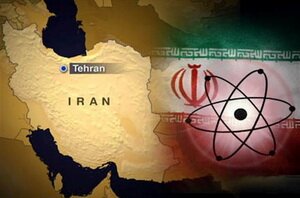
The period of time from the 5th to the 19th of December of the outgoing year had been marked by a few, formally isolated, but, undoubtedly, tightly interrelated, important political events.
The pictures of a little boy killing a hostage with a huge hatchet had spread all over the world. They looked familiar. Something like that had happened before. Children in camouflage with Kalashnikov automatic rifle and bandages on their heads reading “Allah Akbar” Under the revolutionary slogans there is a large scale redistribution of power, raiding, robbery and capturing hostages in order to get ransom. It had been like that in Afghanistan and in Iraq, Palestine, Libya. Now it is taking place in Syria.
It seems that if not the immense wish of the opposition to remove the ruling regime, if not the foreign help to it by weapons and money, there would not be the thousands of killed and maimed Syrians, regardless of their religion.
The USA in their time did not let Russia to supply Iran with the C-300 defense missile system, but right now the Americans have decided to deploy on the permanent base 6 batteries of missile complexes "Patriot" in Turkey, which "will play an exclusively defensive role, covering the Turkish territory from possible missile fire from the Syria’s side”! Two batteries “Patriot” and 400 servicemen will be supplied by Germany, two batteries and 360 servicemen will arrive here from Netherlands already in January 2013.
«Patriots» on march
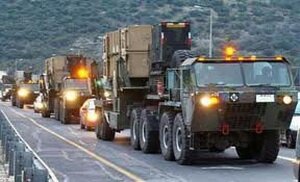 The deployment of this system in Turkey concerns Syria as it may be the first step in creating a non fly zone. It seems that under the cover of the civil war in Syria, Washington is actively trying to involve Ankara into the deployment of an antimissile infrastructure in the region. It is known that Turkey has already received an AN/TPY-2 mobile radar system with the phased array, which has become a part of the information-intelligence component of the US global system of interception of ballistic missiles. The operative control of these systems will be put under the command of the chief commander of the joint military forces of NATO in Europe, which in fact means practical deployment in the nearest future of NATO’ control points immediately near Syria and Iran.
The deployment of this system in Turkey concerns Syria as it may be the first step in creating a non fly zone. It seems that under the cover of the civil war in Syria, Washington is actively trying to involve Ankara into the deployment of an antimissile infrastructure in the region. It is known that Turkey has already received an AN/TPY-2 mobile radar system with the phased array, which has become a part of the information-intelligence component of the US global system of interception of ballistic missiles. The operative control of these systems will be put under the command of the chief commander of the joint military forces of NATO in Europe, which in fact means practical deployment in the nearest future of NATO’ control points immediately near Syria and Iran.
Another factor, pointing to the suitable moment for the USA’s involving Turkey into its regional plans, is the economic side of the question.
At the end of November the world mass media raised the theme of Turkey’s paying for the delivery of oil and gas from Iran with the help of barter transactions, the key point of the mutual payments having been gold. The subject was raveled by the American mass media, which were quoting too high estimations of the growing dependence of Turkey from Iranian oil and gas (it was pointed out, that due to the latest estimations, the share of the Iranian delivery makes 51% of all the oil Turkey needs). The world mass media did not ignore the growing volumes of the Turkey-Iran trade, having published the following figures: despite the regime of sanctions, both the countries closed the 2011 year with the trade circulation of 16 billion US dollars, and within the 9 months of 2012 they have exceeded the previous year’s line, having achieved the level of 18.8 billion US dollars.
Alongside with deploying missile systems in Turkey, the White House lately has been very energetically considering versions of active intervention into the Syrian conflict in order to help the rebels to defeat Bashar Assad, the New York Times reports. The newspaper’s journalists suggested the possibility of sending CIA (Central Intelligence Agency) or other related special services for a work with the local rebels. This version, to their opinion, has a slender chance though. But the newspaper states, that Americans sometimes do realize most risky and improbable scenarios, if the latter promise some geopolitical profit.
Mass Riots in Egypt
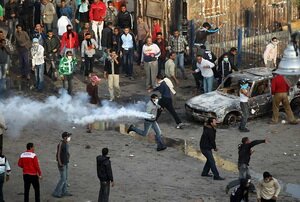 Meanwhile, in Egypt a sharp political crisis is going on, caused by the actions of the country’s president Mohammed Morsi. In Cairo and a number of other cities of the Arab Republic of Egypt (ARE) there took place mass meetings of the opposition forces, demanding to cancel the constitution declaration of the 22nd November and to delay the referendum on the new Egyptian constitution. On the 5th of December M. Morsi issued the decree forbidding using force against the demonstrators. It was also stated, that “the administration is not responsible for the conflicts in Cairo”. The oppositionists declared that the cities of Alexandria, El Mansura and El-Mahalla El-Kubra are “Islamists free".
Meanwhile, in Egypt a sharp political crisis is going on, caused by the actions of the country’s president Mohammed Morsi. In Cairo and a number of other cities of the Arab Republic of Egypt (ARE) there took place mass meetings of the opposition forces, demanding to cancel the constitution declaration of the 22nd November and to delay the referendum on the new Egyptian constitution. On the 5th of December M. Morsi issued the decree forbidding using force against the demonstrators. It was also stated, that “the administration is not responsible for the conflicts in Cairo”. The oppositionists declared that the cities of Alexandria, El Mansura and El-Mahalla El-Kubra are “Islamists free".
At the same time, mass actions in support of the referendum and president M. Morsi were organized by his supporters from the “Freedom and Justice" party, a political wing of “Muslim Brotherhood”, members of the radical salafit party "An-Nur" and other Islamic groups. There were gory clashes of the oppositionists with the Islamists. 28 offices of the “Muslim Brotherhood” in different cities of Egypt were set on fire.
On the 8th of December Egyptian military commandment called the conflicting sides to a dialogue, having warned them that if they do not find a compromise decision, the army will interfere. The military also promised to protect the state structures and peaceful citizens, to put stops to fighting, and, the most important, it was declared that the army will not allow a catastrophe to happen.
On the 8th of December in the framework of the announced by M. Morsi “national dialogue” his talks with representatives of different political parties began. At this, the participants of the talks were mainly Islamists in the person of PFJ and a number of minor parties and organizations that hardly have any weight in the society. The largest opposition parties, united into the “Front for Rescuing the Motherland” and youth movements refused to participate in any dialogue with the authorities until their main demands are satisfied, such as the delay of the referendum and canceling the constitutional declaration.
After the talks, at night of the 9th December it was announced that the president had annulled the constitutional declaration (signed by him on the 22nd of December), but he confirmed that the referendum will take place on the appointed date - the 15th December. And it did take place. According to the Higher Election Commission, more than 70 % of the Egyptians who came to the elections gave their voices for the version of the main law.
6 non-governmental organizations (NGO), who conducted the monitoring of the first stage of the constitutional referendum in Egypt, demanded to arrange a second voting. In the observers’ opinion, the referendum was conducted with a lot of breaches. Among them - a smaller number of judges who had to watch the course of the referendum, presence of the “Freedom and Justice” ruling party members at polling stations. Besides, it is stated that some Christians and women were not allowed to vote at all. The organizations who had participated in the monitoring said they had received more than 4 thousand complaints about different breaches and violations.
The NGO called the Higher Election Commission to do all they can to avoid the repetition of the similar situation in the course of the second stage of the referendum appointed on the 22nd December. It will be conducted in the regions that had not been involved in the first stage of voting. Meanwhile, the Project of the Constitution, presented by the President, lawfully secures the predominance of Islam in the Arab state. Besides, the text of the Main Law contains some ideas of Shariat - the religion law of Muslims. Some analysts think that the adoption of the new constitution will be the beginning of the creation of a new state, similar to Saudi Arabia.
In general, estimating M. Morsi and his followers' actions, a conclusion can be drawn that the Islamists, having receded in the little (cancel of the declaration of the 22nd November), maintained their positions in the main - they did not delay the referendum on the presented by them constitution, which they are trying to foist to Egypt.
Armed opposition forces advancing
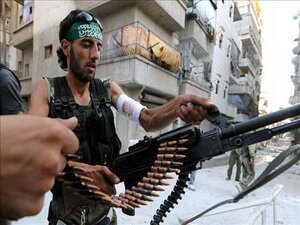 Tense is the situation in Syria, where the fights between the government’s forces and the forces of armed opposition continue. Thus, the fiercest fights took place in the regions near Damask. The rebels’ forces unsuccessfully tried to block the Damask international airport in order to then capture it. The fights took place also in the city and in the Aleppo province, as well as in other provinces. In the north-east the fights between the forces of opposition and local Kurds (uniting “for the sake of defending the Syrian Kurdistan”) began again. The Turkey is reported to have moved the main field of anti-Kurd counterrevolutionary operations from the Turkey - Iraq border to the Turkey - Syria one.
Tense is the situation in Syria, where the fights between the government’s forces and the forces of armed opposition continue. Thus, the fiercest fights took place in the regions near Damask. The rebels’ forces unsuccessfully tried to block the Damask international airport in order to then capture it. The fights took place also in the city and in the Aleppo province, as well as in other provinces. In the north-east the fights between the forces of opposition and local Kurds (uniting “for the sake of defending the Syrian Kurdistan”) began again. The Turkey is reported to have moved the main field of anti-Kurd counterrevolutionary operations from the Turkey - Iraq border to the Turkey - Syria one.
On the 8th of December the Syrian officials announced that the rebels had gained the control of the chemical factory near the city of Aleppo. Immediately the Ministry of Foreign Affairs of Syria sent reports to the Security Council of the UN and its General Secretary, expressing a serious concern with the possible using of chemical weapon by “terrorist groups”. The official Damask also stressed, that it will "under no circumstances" use chemical weapon. Most possibly they meant the chemical factory of the city of Al - Safira, captured by the jihad rebel group “Front al - Nusra”. It is significant that after the capture of the chemical factory the group was announced a terrorist organization by the USA with all the consequences. The question arises, why the Americans did not consider it terrorist before and supported it as a fighting unit of the opposition in the struggle against Assad’s regime?
The official Damask categorically denies its preparations for using chemical weapon against the rebels, accentuating the society’s attention on the fact of NATO and USA’s using this subject for military invasion.
The leaders of the armed opposition groupings at the meeting in the Turkish Antalya elected the Unified Military Command (UMC) of 30 people, representing different rebel groups. Two thirds of the UMC are connected with the “Muslim Brotherhood” and other Islamic groups. The chief of the headquarters of the UMC is the former brigadier general of the Syrian army S. Idris. The commandment is supposed to cooperate with the newly formed the National Coalition for Syrian Revolutionary and Opposition Forces (NCSROF) ", as a lawful representative of the Syrian people and structure, heading the forces of the opposition". Foreign representatives promised an all-round assistance to UMC in its struggle against Assad’s regime. It is remarkable, that at the meeting were not present the head of the Free Syrian army (FSA) Colonel R.al-Asaad and General M. ash- Sheikh, known for his opposing "Muslim Brotherhood". Representatives of the tightly connected with «al-Qaeda» grouping - "Front al-Nusra" had not been invited to “Antalya either.
Representatives of the uncompromising Syrian opposition openly state that creation of the new structure was devoted to the meeting of the so called "Syria's Friends" in Marrakesh on the 12th of December, which testifies to the preparations of the USA and their allies-Arabian monarchies for realizing not only political, but also military intervention into Syria’s affairs.
Some analysts ask themselves a question: why did a military invasion not happen before? There may be a few reasons for this. The position of Russia and China in the UNSC leaves the possible intervention without UN’s protection, and thus makes it unlawful. The Syrian army has shown its high fighting capability, so great losses among the participants of the intervention are inevitable. As a result, it looks like the intervention will go on being carried out by the mercenaries from the Syrian rebels and so called “volunteers” from other countries of the region. As to their “UMC”, it was needed only for joining NCSROF. The west and Arabian monarchies recognize this coalition, and thus its military wing too, and they intend to go on supplying the mercenaries with weapon, hoping that this will change the situation in Syria.
CVN- 69 “USS Dwight D. Eisenhower” a striking nuclear aircraft carrier
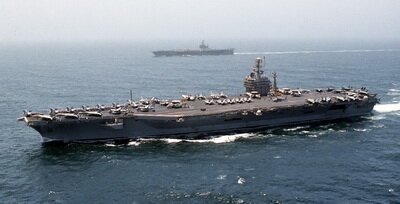 Meanwhile the USA keep accumulate their Navy’s grouping in the Eastern Mediterranean Sea near the coast of Syria. CVN- 69 “D Eisenhower”- a striking nuclear aircraft carrier, with 70 aircrafts on board has arrived here. In total 17 American combat ships, some of which are armed with cruise missiles, and landing ships with US marines on board are in this region at the moment. The Senate of the USA’s Congress has adopted an amendment to the 2013’s military budget, having put a task before the Pentagon to consider the possibility of the intervention into the Syrian conflict.
Meanwhile the USA keep accumulate their Navy’s grouping in the Eastern Mediterranean Sea near the coast of Syria. CVN- 69 “D Eisenhower”- a striking nuclear aircraft carrier, with 70 aircrafts on board has arrived here. In total 17 American combat ships, some of which are armed with cruise missiles, and landing ships with US marines on board are in this region at the moment. The Senate of the USA’s Congress has adopted an amendment to the 2013’s military budget, having put a task before the Pentagon to consider the possibility of the intervention into the Syrian conflict.
Against a background of military preparations, Iran has expressed a categorical protest against the foreign intervention into Syria and offered a plan of regulation of the conflict, containing six main points, including complete stoppage of violence and weapon delivery, giving up the idea of a military intervention, beginning of the inner Syrian national dialogue and conducting (“in a suitable time”) parliamentary and presidential elections.
Deputy Head of the Iranian Ministry of Foreign
Affairs Hossein Amir Abdollahian
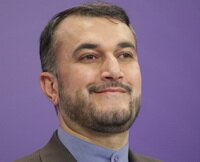 Deputy Chief of the Iranian MFA Hossein Amir Abdollahian reported that Russia, Saudi Arabia, Turkey and Egypt, as well as a Special Envoy of the UN and Arab League (AL) on Syria Lakhdar Brahimi have made themselves familiar with the Iranian initiative.
Deputy Chief of the Iranian MFA Hossein Amir Abdollahian reported that Russia, Saudi Arabia, Turkey and Egypt, as well as a Special Envoy of the UN and Arab League (AL) on Syria Lakhdar Brahimi have made themselves familiar with the Iranian initiative.
The Syrian conflict keeps influencing the development of the situation in neighboring countries more and more. Thus, in the north of Lebanon restarted the fights between Sunni fighters, supporting Syrian armed opposition, and local Alawite - supporters of B. al-Assad. Units of the Lebanon's army were brought and took the situation under their control.
Peace settlement with the Palestinians through negotiations
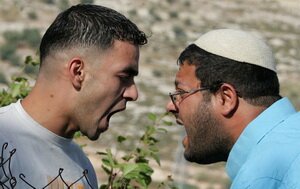 At the very beginning of December the Prime Minister of Israel B. Netanyahu stated about his support to the idea of peaceful regulation of the conflict with Palestinians through talks at the base of the principle of “two states for two peoples”. At the same time, the Israeli leaders do not give up the plans of building new Jewish settlements at the Palestinian territories.
At the very beginning of December the Prime Minister of Israel B. Netanyahu stated about his support to the idea of peaceful regulation of the conflict with Palestinians through talks at the base of the principle of “two states for two peoples”. At the same time, the Israeli leaders do not give up the plans of building new Jewish settlements at the Palestinian territories.
Meanwhile, according to the information of the American “Defense News", dated to 11th December 2012, Israel is going to buy from the USA a large party of highly accurate air weapon. According to “Defense News", the day before Pentagon informed the US Congress about the bargain which was being prepared, and the sum of which is estimated in 647 million US dollars. In particular, Israel is ready to buy 6.9 thousand aerial bombs with tail parts, containing the equipment for guidance by GPS (highly accurate aerial bombs of direct attack, JDAM) made by Boeing company. The supposed contract will include the delivery of 3.5 thousand small size aerial bombs from the same producer.
“Defense News” points out that the deal has been prepared against the background of the growing tension in the Near East, connected with Iran's nuclear program. The USA, other countries of the West and Israel constantly accuse Teheran of its development of nuclear weapon under the cover of the program of peaceful atom. At this Israel does not exclude the possibility of carrying out a military operation by its own forces in order to destroy Iranian nuclear objects.
The head of the political bureau of the Palestinian movement HAMAS Khalid Mashalat the beginning of December for the first time visited the Gaza Strip, where he participated in the celebrations on the occasion of the 25th anniversary of the organization. In Gaza he declared that HAMAS does not recognize Israel, and that "Palestine is our land from the Mediterranean Sea to the Jordan River, and I cannot give up a single inch of it".
The prospects of restarting the Palestine - Israel talks about peace were discussed by King of Hashemite Kingdom of Jordan Abdullah II and the President of the Palestinian National Authority M. Abbas in Ramallah on the 6th December. Abdullah II has become the first foreign leader who visited the Palestinian territories after the UN General Assembly's decision to recognize Palestine as an observer-state.
"... We will not apply sanctions against a number of the largest importers of Iranian oil"
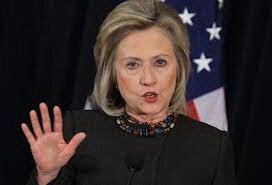 Washington again decided not to apply sanctions against a number of the largest importers of the Iranian oil due to their gradual decreasing the volumes of the purchases of this raw material. This was stated by the United States Secretary of State H. Clinton on the 7th of December. The countries meant here are India, China, South Korea, Malaysia, Singapore, Taiwan, Turkey, Sri-Lanka and RSA. At the same time, the Prime Minister of Turkey R.T. Erdogan says, that Ankara will continue buying gas from IRI, even if the international sanctions are applied against the country.
Washington again decided not to apply sanctions against a number of the largest importers of the Iranian oil due to their gradual decreasing the volumes of the purchases of this raw material. This was stated by the United States Secretary of State H. Clinton on the 7th of December. The countries meant here are India, China, South Korea, Malaysia, Singapore, Taiwan, Turkey, Sri-Lanka and RSA. At the same time, the Prime Minister of Turkey R.T. Erdogan says, that Ankara will continue buying gas from IRI, even if the international sanctions are applied against the country.
The situation in Iran remains stable. More and more often the experts dwell at the question, "Do economic sanctions work?” And more often they find the answer to it in the certain steps of the Iran's leaders in getting the country out of the economic blockade and in real figures of the economic development of Iran. For example, according to the data of the Custom authority of Iran, within 8 months of 2012 (20 March-22 November) the volume of the Iranian import from the European countries in the cost expression made up 10.2 billion US dollars. Statistical data confirm that within the mentioned above period of time the greatest quantity of production was imported from Asian countries at the total sum of 26.6 billion US dollars and the share of these countries is 55% of all the import in the weight expression and 70% - in the cost expression.
Import from Asian countries for the 8 months of this year in the weight expression has grown by 16 % and in the cost expression - by 7%. At this the share of the European countries is 23 % of all the import in weight expression and 27% - in cost expression. In the weight expression the import from European countries has grown by 101%, and in cost expression it has fallen by 4%.
Iranian Energy Minister Majid Namjou
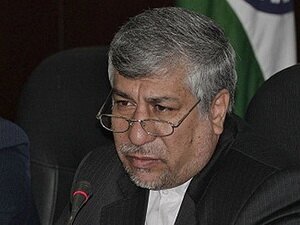 Minister of Energy of Iran Majid Namjou at the official ceremony of the opening of the steam energy blocks of the electric power station of a combined type “Shohadaye Pakdasht in Pakdasht district of Tehran Province, on the 11th December 2012 stated to the The Islamic Republic News Agency (IRNA), that Iran in the aspect of electrical energy has reached the level of self-sufficiency. According to him, over the last 7 years, the volume of the exported by Iran electrical energy has doubled and at the moment actually all the neighbor countries use the electric energy exported by Iran.
Minister of Energy of Iran Majid Namjou at the official ceremony of the opening of the steam energy blocks of the electric power station of a combined type “Shohadaye Pakdasht in Pakdasht district of Tehran Province, on the 11th December 2012 stated to the The Islamic Republic News Agency (IRNA), that Iran in the aspect of electrical energy has reached the level of self-sufficiency. According to him, over the last 7 years, the volume of the exported by Iran electrical energy has doubled and at the moment actually all the neighbor countries use the electric energy exported by Iran.
According to the official information, Iran in the current Iranian year has increased the export of steel and got into its budget 390 million US dollars, which is by 12 % more than within the same period of last year. In 2013 Iran will be able to give up import purchases of steel, which make about 7 million tons, and to satisfy the country's needs in steel by its own production. As it is known, the volumes of steel production in Iran over the 5 months of the calendar year have increased by 8.8% and made 6.25 million tons.
Somewhat different is the situation in the sphere of oil production. According to the forecasts of the International Energy Agency (IEA), oil production in Iran, decreased to minimum due to the strict international sanctions applied against Tehran, will keep decreasing at the beginning of 2013 too. As the experts point out, after an inconsiderable livening of the Iranian oil industry in October of 2012, when the oil production increased up to 2.72 million barrels per day, in November 2012 the level of oil production fell down to 2.70 million barrels again.
Over the latest years daily Iranian oil production was at the level of 3.7 million barrels. Its gradual decreasing began at the end of 2011. Present moment volumes of oil production are unprecedented since the time of isolated periods of Iran-Iraq War in 1980s. Partially these losses were compensated by the reorientation of export. The decrease of the purchases from the side of China and India was compensated by increasing of the export to Malaysia, Taiwan and UAE. In the opinion of experts, European and Asian countries are reducing the oil import from Iran in order to keep their guarantees of the access to the financial system of the USA.
Iranian information agency ISNA on the 12th of December informed that the Iranian first line reserves, but gold, in the current year have made 69.6 billion US dollars. Financial analysts forecast lowering of the first line reserves within a few years that follow. Thus, in 2013 the first line reserves of Iran can decrease by 5 billion US dollars and will make 64 billion 609 million. In 2014 this index can make 63 billion 609 million, in 2015- 62 billion 609 million, and in 2016- 61billion 610 million. For the year of 2017 the first line reserves of Iran, but gold, are forecasted to make 60 billion 612 million US dollars.
Not only Iran is suffering losses from the applied sanctions, but so are other countries. For example, Ministry of Finance of the USA fined the British “Standard Chartered Bank” by 327 million US dollars, having accused it of suspicious operations with Iranian banks. In the accusation there figured a sum of 250 billion US dollars, supposedly laundered through the British finance structure.
A member of the Iranian Parliamentary Committee of National Security Avaz Heydarpour on the 12 of December made a statement, according to which Iran is ready to start producing unmanned air vehicles (UAV) similar to the American UAVs Scan Eagle and RQ-170 "Centinel". Before we spoke about the achievements of Iranian IT specialists, who managed to hack the system of control of the American UAVs, and began landing them successfully at their territory. It is hard to believe, but the Iranian professionals have overplayed the American ones and through back designing got into their disposal new technologies and models of modern weapon.
North Korea's ballistic missile “Unha-3"
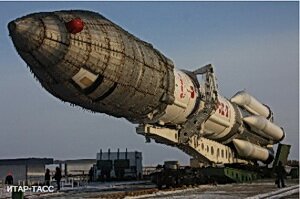 On the 12th of December North Korea successfully launched its first ballistic missile, which alarmed all the top political circles. Secretary-General of the United Nations Ban Ki-moon immediately and sharply disapproved of breaking the resolutions of the Security Council, according to which North Korea had no right to test ballistic missiles. A few days before launching of that missile, in western mass media there was information that in the preparation for the test, Korean military were assisted by Iranian specialists. Iran rejected those accusations with indignation. Was the indignation sincere? Most likely it was not. At least within the last 5-7 years many times the opposite has been proved. Iranian specialists in the field of missile technologies did help their North Korean colleagues in the development and testing of missiles. Isn’t this a way of testing their own developments at someone else’s test site?
On the 12th of December North Korea successfully launched its first ballistic missile, which alarmed all the top political circles. Secretary-General of the United Nations Ban Ki-moon immediately and sharply disapproved of breaking the resolutions of the Security Council, according to which North Korea had no right to test ballistic missiles. A few days before launching of that missile, in western mass media there was information that in the preparation for the test, Korean military were assisted by Iranian specialists. Iran rejected those accusations with indignation. Was the indignation sincere? Most likely it was not. At least within the last 5-7 years many times the opposite has been proved. Iranian specialists in the field of missile technologies did help their North Korean colleagues in the development and testing of missiles. Isn’t this a way of testing their own developments at someone else’s test site?
American analysts believe that Iran by 2015 will be able to have got its own ballistic missile. After the test of the 12th December it is quite reasonable to ask a question, “Is it so in reality?”
Iran: if tomorrow the war ...
Fast missile boats Iranian IRGC Navy
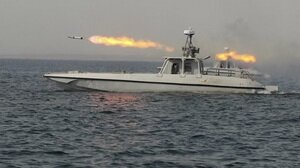 On the 17th of December 2012, from the Iranian information agency “Fars News”, with the reference to the statement of the Islamic Revolution Guards Corps (IRGC) Navy Commander, it became known about the trainings of the IRGC Navy in the Strait of Hormuz at the end of the Iranian current year. Thus, Brigadier General Ali Fadavi in the corridors of the conference under the title of "Geography, development, defense and security in the Persian Gulf and Strait of Hormuz", having pointed to the presence of foreign troops in the region, declared, that Americans with the help of military equipment intend to dominate in the world, and that if their actions increase the danger, it will be natural that they will undergo the threat too. Because the danger in the Persian Gulf threatens the whole world.
On the 17th of December 2012, from the Iranian information agency “Fars News”, with the reference to the statement of the Islamic Revolution Guards Corps (IRGC) Navy Commander, it became known about the trainings of the IRGC Navy in the Strait of Hormuz at the end of the Iranian current year. Thus, Brigadier General Ali Fadavi in the corridors of the conference under the title of "Geography, development, defense and security in the Persian Gulf and Strait of Hormuz", having pointed to the presence of foreign troops in the region, declared, that Americans with the help of military equipment intend to dominate in the world, and that if their actions increase the danger, it will be natural that they will undergo the threat too. Because the danger in the Persian Gulf threatens the whole world.
Head of the "Passive Defense Organization" IRGC Brigadier General Gholamreza Jalali
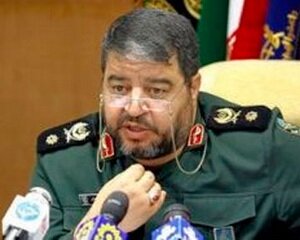 Not long ago in the Islamic Revolution Guards Corps there was established a structure called “Passive Defense Organization” with a Brigadier General Gholamreza Jalali. Speaking about cyber-threats, Jalali pointed out for the correspondent of the Iranian “Mehr” agency that at the present moment there are vulnerable places in the Iranian cyberspace, connected with the lack of proper coordination among different offices and services of the country. In this connection the head of the " Passive Defense Organization " called Majlis to take this fact into consideration while settling the question of reorganization of the Iranian government. Just to remind you - a bit earlier the authorities of Iran made a decision about establishment of the Ministry of Infrastructure by merging Ministry of Communications and Information Technologies, Ministry of Roads and Urban Development. According to the fifth 5-year plan of development (2010-2015), Iranian government has to reduce the number of ministries from 21 to 17, increasing in such a way the effectiveness of the state management.
Not long ago in the Islamic Revolution Guards Corps there was established a structure called “Passive Defense Organization” with a Brigadier General Gholamreza Jalali. Speaking about cyber-threats, Jalali pointed out for the correspondent of the Iranian “Mehr” agency that at the present moment there are vulnerable places in the Iranian cyberspace, connected with the lack of proper coordination among different offices and services of the country. In this connection the head of the " Passive Defense Organization " called Majlis to take this fact into consideration while settling the question of reorganization of the Iranian government. Just to remind you - a bit earlier the authorities of Iran made a decision about establishment of the Ministry of Infrastructure by merging Ministry of Communications and Information Technologies, Ministry of Roads and Urban Development. According to the fifth 5-year plan of development (2010-2015), Iranian government has to reduce the number of ministries from 21 to 17, increasing in such a way the effectiveness of the state management.
As to the Iranian nuclear programs, Tehran is ready to discuss this question with the International Atomic Energy Agency (IAEA), but the agreement on this question has by all means to take into account Iran’s right to enriching uranium with peaceful purpose.
"... In the negotiations with the International Atomic Energy Agency has been some progress"
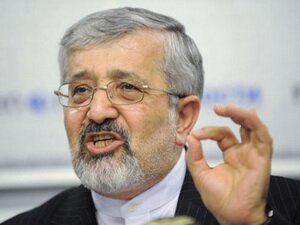 Such a statement was made by the spokesman of the MFA of Iran Ramin Mehmanparast on the 11th December, - on the eve of another round of talks with IAEA, which took place on the 14th December. As to the results of the talks in Tehran, the "talks with the technical delegation of IAEA in Tehran were constructive and a certain progress was achieved",- said the permanent representative of Iran in IAEA Ali Asghar Soltanie. Another round of the talks is appointed for the 16th of January 2013.
Such a statement was made by the spokesman of the MFA of Iran Ramin Mehmanparast on the 11th December, - on the eve of another round of talks with IAEA, which took place on the 14th December. As to the results of the talks in Tehran, the "talks with the technical delegation of IAEA in Tehran were constructive and a certain progress was achieved",- said the permanent representative of Iran in IAEA Ali Asghar Soltanie. Another round of the talks is appointed for the 16th of January 2013.
So, the military-political situation in the Middle East remains tense and threatens with a new aggravation of the situation in the nearest future.

